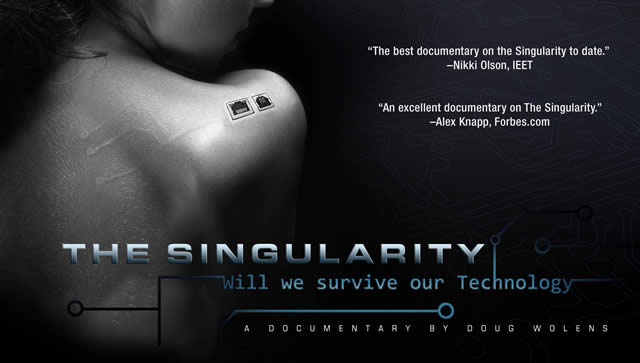|
Toward a Science of Consciousness 2014 The Tucson Conference - 20th Anniversary - April 21-26, 2014
Films / Discussions with Directors
THE SINGULARITY Doug Wolens, Director
TUESDAY APRIL 22 10:00 - 10:30 PM Marriott University Park Ballroom The Singularity is defined as the point in time when computer intelligence exceeds human intelligence. This notion of superhuman machines has long served as fodder for tales of science fiction. Yet many scientific leaders argue that these changes are inevitable, based on the great strides being made in fields such as nanotechnology, artificial intelligence, and molecular biology. However, singularity advocates generally overlook the role that consciousness would play in creating super-intelligent systems. Ray Kurzweil, pointing to Moore’s law and various information technologies that are advancing at an exponential rate, tells us that if we extrapolate the number of calculations-per-second a computer would have to meet in order to be on par with a human brain then machines with greater-than-human intelligence are just the corner. This reductive logic fails to address the complexity and nuance of consciousness as it regards the mind. While it may be possible to create systems with the speed and accuracy of the brain, it begs the question as to whether or not it could be conscious, in the way that we are conscious (without which, by definition, such intelligence cannot be greater-than-human). For this reason, the exploration of consciousness is a focal issue in THE SINGULARITY documentary. To that end Wolens attended Toward a Science of Consciousness in 2008. His interviews with leading scholars help shape the film’s narrative, providing a rich discussion of the role consciousness would play in creating intelligent systems. Through interwoven conversations with David Chalmers, Christof Koch, Wolf Singer, Andy Clark, and Alison Gopnik (each on location in Tucson), juxtaposed with Kurzweil and others in the Artificial Intelligence field, THE SINGULARITY addresses the complexity of the questions the film seeks to answer, including the distinction between intelligence and consciousness as it regards creating a mind. Singer laughs at the idea and argues that building human consciousness would be impossible noting that there are too many possible states of the brain to recreate. Chalmers discusses the hard problem and measuring consciousness, conceding that were a robot to opine about feeling what it is to be a robot, then that may be enough for him. Koch explains that although we really know very little about consciousness we can now point to correlates of consciousness in the brain and that such efforts help us solve the problem in favor of a theory of the mind. Clark reminds us that we may not need to actually create consciousness for the singularity to occur but instead that the singularity can result from augmenting our minds or working closely with machines. Finally Gopnik talks about the quality of machine consciousness, suggesting while that we may be able to create another conscious machine (reminding the viewer that we are conscious machines ourselves) but because they would not be “us” their consciousness would be different. Wolens’ THE SINGULARITY further addresses the moral and social implications were the singularity to occur, inviting the viewer to participate and come to his or her own conclusions regarding the future of science and humanity. Ultimately, if we become more machine-like, and machines more like us, will we sacrifice our humanity to gain something greater? Or will we engineer our own demise? Even if the answers are impossible to know, THE SINGULARITY makes clear that we cannot postpone addressing the questions. All Content © 2014 Doug Wolens
|
|
|||||||||||||
